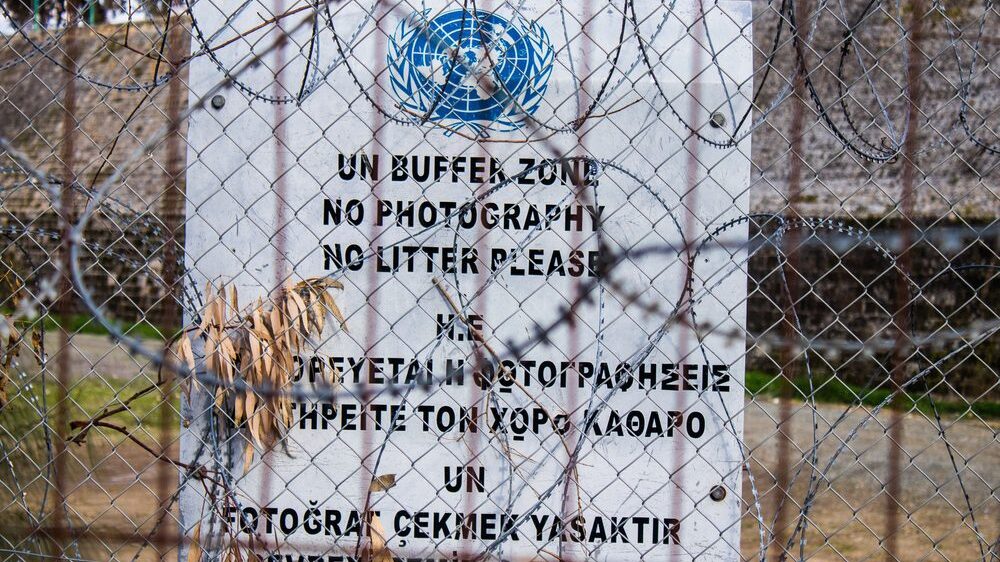
A sign marking the UN’s demilitarized Green Line in Cyprus
Photo: Jose HERNANDEZ Camera 51 / Shutterstock.com
The UN Security Council officially condemned the actions of Turkish Cypriot security forces on Monday, August 21st, after they attacked UN peacekeepers in the ethnically divided island’s demilitarized zone during a dispute about unauthorized road construction.
The Council’s press statement, published after Monday’s emergency meeting, “underscored the need to avoid further unilateral or escalatory actions by any party that could raise tensions on the island and harm prospects for a settlement.”
The incident happened last Friday inside the UN-controlled, demilitarized ‘Green Line,’ which marks the border between the Greek-speaking Republic of Cyprus in the south and the Turkish Republic of Northern Cyprus (TRNC), a breakaway state recognized only by Turkey.
According to reports, UN peacekeepers confronted Turkish Cypriot construction workers near the town of Pyla who had moved UN trucks, cement bollards, and barbed wire to make room for a road across the demarcation line. When the peacekeepers attempted to shut down the unauthorized construction, Turkish security forces wearing police and military uniforms attacked them.
Afterward, the UN confirmed that three peacekeepers were seriously injured and needed hospitalization. “One was kicked to the ground,” the organization’s spokesman said, but added that fortunately, no shots were fired. Several UN vehicles were also damaged.
The first to condemn the Turkish Cypriots’ actions were the U.S., the UK, and France, three out of the five permanent members of the UN Security Council. “These actions are completely unacceptable and undermine the ability of the UN to fulfill its peacekeeping mandate,” their embassies said in a joint statement.
The three countries also called for an immediate halt to the unauthorized construction work–which was started to connect the TRNC with an ethnic Turkish settlement on the other side of the line–and to remove the equipment immediately. Both requests were fulfilled over the weekend.
After the joint statement, Ankara immediately took a defensive stance, calling the road project “essential” for humanitarian purposes and the actions of the UN forces “unacceptable and extremely wrong” since the construction was conducted on the TRNC’s sovereign territory and meant to provide access to its own citizens. In response, the UN stated that none of this was true, as the village lies nearly 12 kilometers inside the ethnic Greek territory and the construction took place “firmly” within the buffer zone.
According to inside information, Monday’s Security Council meeting was long and full of obstacles in reaching an agreement, but the joint press statement was finally issued, in which the body expressed “serious concern” about the incident and unilaterally condemned it. The Security Council stressed that any construction inside the Green Line constitutes a “violation of the status quo” and that attacking UN personnel is a crime under international law.
The statement, however, welcomed the halt of construction and the removal of equipment by the Turkish Cypriots and encouraged “both sides to take tangible steps in support of the efforts of the [UN] to promote a conducive climate.” The statement also supported the restarting of formal negotiations in order to reach a just and lasting settlement “based on a bi-communal, bi-zonal federation with political equality,” one that the UN has long been advocating for.
Northern Cyprus broke off after a Turkish invasion in 1974 and proclaimed its independence in 1983. Countless reunification attempts have been launched since then, but none have succeeded. The UN peacekeeping mission on the island is among the oldest of its kind, dispatched even before the split during the 1960s to help control the ethnic violence between the Greek and Turkish communities.
